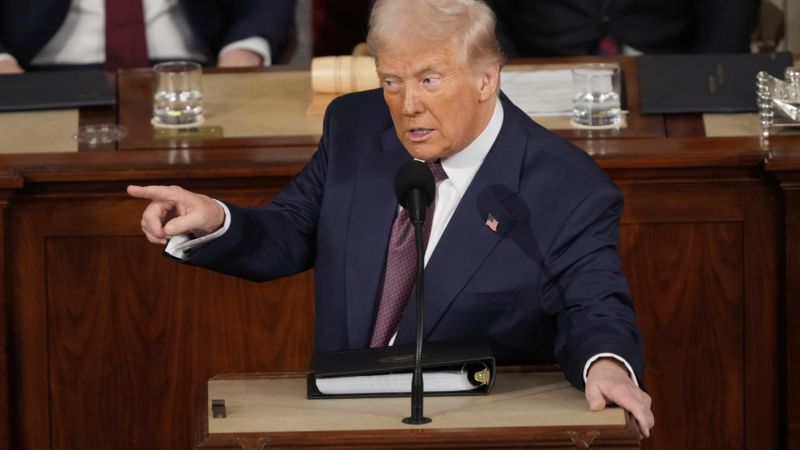Trump dismisses concerns over back-and-forth levies, says ‘tariffs could go up’
President Trump defended his administration’s economic policy after he imposed tariffs on Mexico and Canada last week and then rolled some of those levies back, causing what critics say is uncertainty for businesses and the broader economy.
During an interview with Fox News Channel’s Sunday Morning Futures, Trump dismissed concerns over his back-and-forth tariffs and said they “could go up.”
Fox News’ Maria Bartiromo asked Trump whether he expects a recession during his first year in office. The president couldn’t say.
“I hate to predict things like that,” Trump said. “There is a period of transition, because what we’re doing is very big. We’re bringing wealth back to America. That’s a big thing. And there are always periods of it takes a little time.”
There are some signs that the economy may be headed toward a recession, but Howard Lutnick, the Commerce secretary, told NBC’s Meet the Press there was “no chance” of one.
Last week, the Trump administration said it would place a 25% tariff on cars and auto parts from Mexico and Canada. Soon after, the White House announced a one-month delay on the measure after carmakers Ford, Stellantis and General Motors called the president. During his interview with Bartiromo, Trump explained the move.
“This is short term and I felt for the good of the American carmakers,” Trump said. “I thought it would be a fair thing to do. And so I gave them a little bit of a break for this short period of time.”
Criticism from automakers notwithstanding, Sean Fain, the head of the United Auto Workers, called the tariffs an “attempt to stop the bleeding” in the American economy.
Tariffs “aren’t the end solution,” he told ABC’s This Week, “but they are a huge factor in fixing this problem.”
Meanwhile, the stock market had it’s worst week in 6 months with the S&P 500 dropping 3.1% and Nasdaq down 3.45%. Fox News’ Bartiromo asked the president whether the uncertainty over tariffs — which many economist say is causing stocks to slump — will continue or if there will be clarity for businesses.
“Well I think so,” Trump said. “But you know the tariffs could go up as time goes by and they may go up.”
Trump also said he still plans to put in place next month “reciprocal” tariffs against all trading partners that have tariffs on U.S. goods.
“April 2nd, it becomes all reciprocal,” he said. “What they charge us, we charge them.”
Congress failed to extend Obamacare subsidies. This Democrat says Trump can save them
Sen. Peter Welch, D-Vt., says he thinks the Senate can pass a "retroactive" Affordable Care Act subsidy extension, but "we need President Trump."
Rideshare union rights, social media limits and other state laws taking effect Jan. 1
Every new year, public media reporters across the country bring us some of the new state laws taking effect where they are. Here are six in 2026.
Guides to help you tackle your New Year’s resolutions
From building your strength to tackling credit card debt, NPR's Life Kit has a newsletter journey to help you tackle your New Year's resolution.
Guides to help you tackle your New Year’s resolutions
From building your strength to tackling credit card debt, NPR's Life Kit has a newsletter journey to help you tackle your New Year's resolution.
Dozens presumed dead in fire at Swiss Alps bar during New Year’s celebration
Dozens of people are presumed dead and about 100 injured, most of them seriously, following a fire at a Swiss Alps bar during a New Year's celebration, police said Thursday.
Crypto soared in 2025 — and then crashed. Now what?
For most of 2025, cryptocurrencies such as bitcoin surged as President Trump vowed to make the U.S. a crypto leader. But now, a severe sell-off has shaken the sector.






